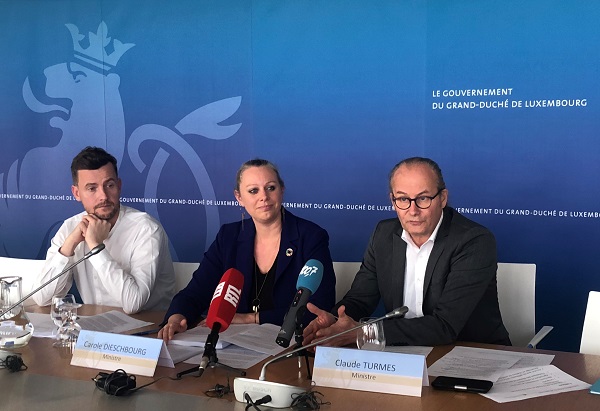 L-R: Joé Ducomble, MECDD; Carole Dieschbourg, Minister of the Environment, Climate and Sustainable Development; Claude Turmes, Minister of Energy;
Credit: MEA
L-R: Joé Ducomble, MECDD; Carole Dieschbourg, Minister of the Environment, Climate and Sustainable Development; Claude Turmes, Minister of Energy;
Credit: MEA
Last Friday, the Luxembourg Cabinet passed a new bill aimed at accelerating national climate protection efforts.
Luxembourg's Minister for the Environment, Climate and Sustainable Development, Carole Dieschbourg, and Minister of Energy, Claude Turmes, presented the bill at a press conference on Friday, the same day that it was approved by the Cabinet.
In order to address the climate emergency, the Luxembourg government has decided to accelerate its climate efforts. In this context, the bill provides for a 55% reduction in greenhouse gas emissions by 2030 compared to 2005 levels; the initial target was a 40% reduction. The bill also sees the government commit to reaching net-zero emissions in Luxembourg by 2050 at the latest.
Carole Dieschbourg explained: "The bill sets the framework for Luxembourg's climate policy and accelerates our efforts so that together we can achieve our ambitious goals". Claude Turmes added: "Our climate policy is governed by the principles of climate justice, growth, non-use of nuclear energy and social equity".
More specifically, the bill introduces the notion of binding sectoral climate objectives for five sectors, namely those of energy and manufacturing industries and construction, transport, residential and tertiary buildings, agriculture and forestry, and waste and wastewater treatment. In order to create control mechanisms and to ensure that objectives are achieved, the different sectors must report their current results as part of an annual climate assessment.
Minister Turmes commented: "The setting of binding sectoral climate targets will help ensure that different sectors are more accountable for climate policy and that sector emissions are steadily and continuously decreasing".
In addition, the bill creates three bodies for climate governance to support this climate assessment and to propose additional measures, if necessary. This also aims at ensuring the coherence and transparency of Luxembourg's climate policy. These new bodies are: the Interministerial Coordination Committee for Climate Action, which will be in charge of interministerial coordination of climate policy; the Platform for Climate Action, a multilevel dialogue on climate and energy integrating all relevant stakeholders; the Climate Observatory, an independent body focused on the scientific, ethical and societal aspects of climate policy.
"These three bodies will establish a cooperative, scientific and participative model. This allows us to control, but also to react effectively to developments in different sectors", said Claude Turmes.
The bill also provides for a reform of the "Climate and Energy Fund". These changes will apply to "supply, eligible investments and governance", according to Minister Turmes, who added that "[f]or example, it will now be possible to finance measures to adapt to climate change in our forests".
Finally, the bill provides for an update of the former provisions on the greenhouse gas emissions trading scheme (EU-ETS), in particular through the increase of sanctions. Commenting on this third part of the bill, Claude Turmes explained: "We are therefore establishing with this text the necessary structures to be able to contribute to the objectives of the Paris agreement, not only in non-ETS sectors, but in all sectors".








